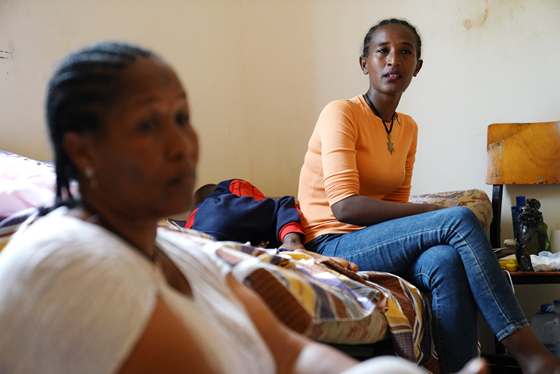Ethiopia: Rape, Dread and Despair Amid the Churches of Lalibela
by Jemal Countess and Jeff Pearce

The legend is that angels helped build the stunning churches hewn out of volcanic rock in Lalibela centuries ago. If you’re a person of faith, you might choose to believe that the angels watched over and guided members of the Desalegn family. They were among the first who escaped the TPLF occupation of Lalibela. But life as Internally Displaced Persons has not been easy since.
“My husband is very worried,” says Kidist Desalegn, 23. “We have nothing to eat. Our minds are restless, not at peace. Overall, we are not happy here. We don’t have a house here, we don’t have a job — we always have concerns. We are to pay rent in six days. We think about where the money will come from.”
The Desalegn family packed up what they could and left Lalibela when word came that the TPLF were coming. Then on August 4, the city was invaded. First came the youth, so small they needed to drag their guns behind them. Then came the cadres, and then the looters, stealing money, machinery, and vehicles from the local government offices and citizens alike, apparently for them to be whisked back to Tigray. Witnesses think the looters were mostly university students, they themselves forced into the new responsibilities of transporting whatever goods and resources could be taken from the city.
Those locals who stayed behind took the TPLF at their word about being respectful to the churches and towns, but that promise proved empty soon enough. Some residents fled to a town commonly known as Aina Bugna — technically, Aina Jesus in the district of Bugna, but people usually use the shortened form. The town’s about 40 minutes northwest of Lalibela. When the TPLF swooped in on Aina Bugna, they let their worst sexual predators off the leash. A 13-year-old girl was violently raped in her home on Ethiopian New Year.
When the monsters had finished violating her, the floor was covered in blood. Months later, she is still in Aina Bugna, traumatized, barely having received medical treatment.
About 20,000 people would normally call Lalibela their home. Now the residents are scattered, many having wound up in Bahir Dar, and perhaps the best way to assess the horrible trauma on this town is how it’s affected one family. And that 13-year-old girl is a friend of the Desalegn family. When the TPLF came, Kidist’s sister, Firegenet, 28, her five-year-old son, and other relatives made the long trek from Lalibela to Gera Gera, and then from Gera Gera to relative safety. Kidist had been looking forward to the baptism of her newborn child — now she had to carry her baby across an arid desert for days.
Jemal Countess says, “The smiles and warmth that the family displayed as I sat down to meet with them hardly gave indication of the trauma and stress they had just endured and was still enduring.”
It was Firegenet who did most of the talking about all they had seen, while other young women and girls wept quietly as they reclined next to them. An older brother was in busy in Bahir Dar, securing resources and searching for work, while Kidist’s husband had left Bahir Dar to hunt for a job.
Others never got the chance. Firegenet had a friend who stood up to the TPLF’s bullying and aggression in the streets, and he was one of four locals murdered, execution-style, that she knows of. Residents weren’t allowed to remove his body for three days. By day, the TPLF was trying to give the world the impression of a peaceful occupation force, but by night, says, Firegenet, it went on silently killing.
According to Firegenet, the child soldiers who made up the first wave of invasion of Lalibela came hungry, even willing to exchange their weapons for food. Wanting to be deserters, they asked locals to hide them. Let that sink in for a moment and think about the idiots who tried to justify the use of child soldiers after the New York Times, AP and Reuters obliviously revealed their use in photos and video. These are children. Children still being children, acting as children, appealing to the nearest adults they thought who could save them — which, in this case, are the very people these online advocates insist they go fight to their potential death.
Now the airport in the town has been turned into a camp for the child soldiers, with 3,000 of them stationed there, being trained to be cannon fodder.
Among them is a boy who let himself be conscripted because he had already lost his mother, and now here in jeopardy was his father, who would have been put to death had he not released his son to the TPLF. The boy simply didn’t want to lose his Dad. And now he fights — because he has to.
“For those who stayed in Lalibela,” says Firegenet, “they told us that they began to only cook at night because during the day, if they saw smoke rising from your home, they would come knocking on your door, demanding to be fed. And once they ate, they left, usually leaving you with next to nothing if anything at all.”
So, yes, there is a food shortage in Lalibela, but it’s mainly because inhabitants are literally being eaten out of house and home by the TPLF. “So, in order to eat in peace, some residents resorted to cooking in the middle of the night in order to cook what little they had and be the ones who ate it.”
When last Jemal Countess got to discuss things with the Desalegns, Kidist echoed her family’s sentiments, “I miss my home, I miss the churches and my city, we miss everything. We just want to go home.”

Front row: Firegenet’s son and Africa Desalegn. Photo by Jemal Countess, used with his permission.
